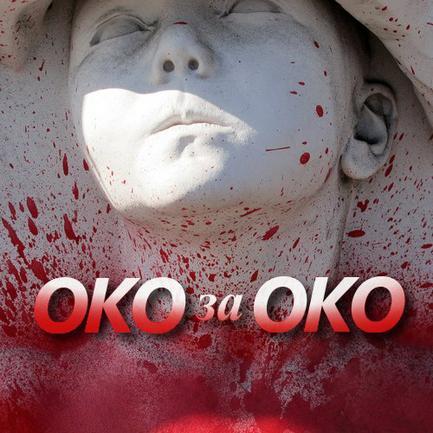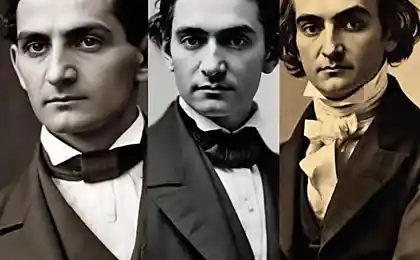1318
Eye for eye

Recently, the city of St. Petersburg crowd of natives of Russia's largest tourism cluster, armed with pistols and faith in Allah, attacked the guards nightclub. What a wonderful video preserved: the shot hit the sound of gunfire, shouting "Allahu Akbar" and other advertising slogans Caucasian tourism. In the city police decided the situation simply - raided the clubs. No clubs - no problem. But those whose cerebral blood flow is not disrupted long-term wearing cap, is unlikely to satisfy such a wise measure. So, how do we really provide a strong interethnic peace?
The answer long ago proposed a political scientist Robert Axelrod in his classic work, for a better understanding of which is necessary to first clarify a couple of points. "Game Theory" - it is a branch of mathematics that studies, as you might guess, strategy games. Games involve any interaction, which involves two or more players who can change their behavior to achieve a win - in short, everything that happens around us. Prior to the widespread use of game theory in the social sciences, humanity has reached only to the middle of the 20th century (thanks to people like John von Neumann and John Nash). About ever since game theory, when applied to economics, sociology, political science, psychology, and others like them, blows the minds of researchers unexpected paradoxes.
Dilemma
The most famous of these paradoxes is the "prisoner's dilemma", once born in the depths of the American RAND Corporation (specialists familiar with this game at the "see it I can not," which is not the general public). Name it owes to the fact that in its first version featured a pair of prisoners, "prize" which was a prison term less. But the essence of the game is much easier to understand if we are talking about money: There are two players who can either cooperate or not. If both cooperate - get $ 3 on the nose; both refuse - get on the dollar; one refuses, the second cooperating - refusenik gets 5 and naive goes to zero.
Simple, is not it? But here's the paradox: despite the fact that both parties beneficial cooperation, in this game it is best to be a scoundrel and go into denial. See for yourself if the other player chooses a failure, you will also benefit from the refusal (get $ 1), if the player chooses cooperation ... you too profitable to give up and to break the bank ($ 5). Disclaimer - the so-called dominant strategy in this game. From the point of view of a heartless mathematics - both players just have to go into denial.
This leads to the pessimistic thoughts about the world around us. However, when a game is not planted mathematicians, and warm-blooded people live - the result was the opposite. They sought to cooperate. And we have no special experiments we see that the world is built on cooperation. It was found that the benefits of cooperation occur when the game becomes a multi-way (iterated) - hence our habits. More profitable to get $ 3 for many moves than disrupt a five-dollar jackpot, which will lead to a fight and a series of one-dollar failure. It is somehow reassuring.
Eye for an Eye
Axelrod said political scientist already interested in the question of the evolution of cooperation. He announced a competition for the best strategy for the "Prisoners' Dilemma" and then arranged between the Royal Rumble. At the competition lacked strategies fraud, trying different ways to trick your opponent, but the winner got an honest strategy of tit for tat (lit.. Translating "what of it", it is also called "an eye for an eye") - that she scored the most points. This strategy starts with the course co-operation, and then simply repeats the opponent's actions. Cooperate if the other player cooperates, and symmetrically punishes him for cheating.
Imagine two primitive people. Before each faces a tough choice to share resources or fellow club hit, take it all. When the unit does not have a club meeting alternatives: if the opponent be friendly, it will be possible to be surprised; if he conceived that something was wrong, he will not be able to surprise you. However, if we are talking about a neighbor, a long-term cooperation becomes much more profitable protracted confrontation. In fact, these processes occur much earlier - in the first game of DNA molecules in the primary flounder broth. After all, to form a winning strategy does not require a conscious choice - carriers of inefficient policies will simply stamped by natural selection.
So it turned out that reciprocal altruism requires neither God nor the Church nor the Central Government. Requires only a couple of media ethics "an eye for an eye" living side by side - they can protect themselves from fraud and will have an advantage thanks to the cooperation with each other. This strategy will be distributed.
Conclusions can be applied to any number of human history and modernity. For instance, Axelrod himself cites the First World War. Then, as a result of protracted trench warfare emerged phenomenon infuriating army bosses: the soldiers of the opposing armies were made friends, warning each other about gunnery and deliberately shooting past. Faced indefinitely, they prefer cooperation senseless feud. This example illustrates an important point - the participants do not need to know exactly when the game is over. Otherwise, the last move of the players is not an incentive for further cooperation and will be beneficial to play a waiver. And if we know that the last move is a failure, it becomes profitable and on the penultimate, and so on up to the first.
Easy to see that the function of "an eye for an eye" in human society are the law and the coercive apparatus, standing on his guard - the state. Encourage the individual, if he follows the rules, and inevitably punished for refusing to cooperate (antisocial behavior). A society in which the law is strictly enforced, much more successful than others. We can also assume that the historical success of Judeo-Christianity because of lawlessness in the Dark Ages it was it was the main bearer of ethics "an eye for an eye" - at the same time to encourage cooperation between Christians and crusade against fraud. And before Alexander the Great and the Roman generals established the rule of law over the vast Asian territories.
The history of mankind is inevitably moving towards strengthening cooperation. Individuals are grouped together, the groups are combined into a people united in the Empire State, and they, in turn, to the supranational unions. Confederated Tribes happened thousands of years ago, but the history of such supranational institutions such as the UN or the EU, has only ten years - before the state used to play in the "failure" with each other, in the form of wars and protectionist tariffs. Following this logic, humanity should eventually be combined into a single structure, devoid of military-political borders, customs posts, and other protectionist measures hindering cooperation phenomena.
The young guys on
But back to the topic of "The young guys on," with which I began this text. Why do some people realized the beauty of cooperation, and others, and still prone to child scam? Recall that the game in the multi-pass "dilemma" is possible only with the neighbors. Therefore, this game is only possible between the sedentary agricultural peoples. That is why they gradually cease to be a "warrior", becoming "merchants and diplomats" - it's just more profitable. Quite another to nomadic peoples - their interaction with other wears sporadic. Hence the dominant strategy is an attack on every counter and other indispensable "way of the warrior." The difference in the economic motivation of nomads and sedentary dedicated classic text Mancur Olson. Mountain people for centuries behaved like nomadic peoples - down from the mountains, robbed a farmer, hid in a cave home and can not be afraid of tomorrow's appointment to recur. They develop appropriate warlike culture, identical for all mountaineers (at least if you look at the essence).
What to do with them? European farmers brought their Highlanders (Scottish, Swiss etc.), simply by applying to them the strategy of "tit for tat" inevitable punishment for bad behavior. Axelrod noted that the speed of punitive action is extremely important. After all, if one player refuses to provocation, it sends a signal that it can operate and thereby pushes another player to a strategy of non-cooperation. Therefore, the faster that player will get the right message in the form of a click on the nose, the faster it will understand the benefits of cooperation. It is equally important to one misdemeanor should not more than one sentence. Senseless terror only push the opponent to the fact that most leave in a remote denial.
The correct example is the policy of zero tolerance (zero tolerance) that the US government used against some dull groups. Zero tolerance - is where the perpetrators received severe punishment for a crime, regardless of extenuating circumstances, a difficult childhood, a 300-year history of slavery and colonialism bloody. However, the state can not be present everywhere, so it is desirable that each individual has the opportunity to fight back. If we take the two regions with similar social conditions, the level of violent crime is more likely to lower where there are mountains of firearms on their hands, and not where only allowed to defend tooth and nail. Well, the third paragraph requires the levers of control over the state - in case the state itself decides to play a "failure" in the game with society. Thus, democratic regimes are more successful than oppressive.
Paradoxically, the policy of affirmative action and other false tolerance leads to the fact that its objects are permanently on the barbaric level of development. Whereas zero tolerance gives a pass to the civilization, the cornerstone of which is cooperation. After all, what is tolerance? With the gradual expansion of space cooperation requires people to be able to cooperate, despite the different linguistic, ethnic or religious background is. After sometime between residents of different parts of Germany lay the abyss of hostility and mistrust. So tolerance plays an important role, but as a mechanism to overcome prejudices in mutual cooperation. When one of the parties is in denial, tolerance not only meaningless, but harmful.
In general, you already knew what to do with the militant Highlanders, nomads and all sorts of fighters for the "freedom of the Palestinian people" (and for their own good). And than the current thriving Japanese owe those two atomic bombs. Perhaps someday the world will be ruled by love, friendship and chewing gum. But as long as the world keeps on her shoulders strong middle class with a shotgun in the closet and principles like "my house - my fortress." So, thank God for the United State Marine Corps!
Not so useful idiots
The question remains: if the "eye for an eye" such an effective strategy, then why do not adhere to it all? The fact that the "eye for an eye" is able to bring up a scam. But not in a position to teach wits naive strategy that prefers to cooperate, even if it is beating his boot in the face. Such a strategy will thrive, living next to the "eye for an eye" (they will always cooperate). Until then, until you come across a cheater, who will exploit such a meek idealist. Fraudsters will happily eat naive, until they run out, and then run out and fraudsters themselves, deprived of food resources. Case uncommon for wildlife and for human history. How many times warlike nomadic peoples of the roots were cut neighboring farmers? And where now those warlike nations? You can cite as an example and some modern welfare states in which the generous distribution of public goods only spawns a horde of parasites, no closer to those of civilization.
But the closest example to us - fattened budgets North Caucasus. The current Caucasus plays a "failure" at the individual level (in the form of anti-social behavior with impunity some Caucasians), and group (receiving grants from the Federation and giving nothing in return). Mutual cooperation there exists only the elite level (for example, Putin and Kadyrov), whereas all of Russian society over and over again acts as a useful idiot who continues to cooperate in response to spit in the face. Moreover, society itself is such an idiot does not want to be, as evidenced by multiple local attempts to play "failure" - for example, in the form of reluctance to take Caucasians apartment or pass them through face control in nightclubs (I do not whether this is connected the St. Petersburg episode?). But due to the fact that Russia is not a state or national or democratic, this justified the public "failure" can not become a state policy, he is forced to take the form of small household xenophobia.
We are, of course, cultural and people are well aware that xenophobia, stereotypes and so on - it ay-ay-ay as bad, wild and all. However, what other options we have left in the game against the fraudulent strategies Caucasus? Authoritarianism and legal vacuum tightly closed to us the 'eye for an eye "in the political and legal spheres. Leaving only the ability to play "failure" at the household level, trying to somehow protect themselves from potential scams. But imagine that the regime under the thunderous applause "progressive community" still overcome this shameful fascism in the form of advertisements "only for the Slavs." What will happen then? River reversed, the laws of mathematics to stop working, while guests with Yugov throw away the best strategy for their behavior?
Source Your text to link ...





















